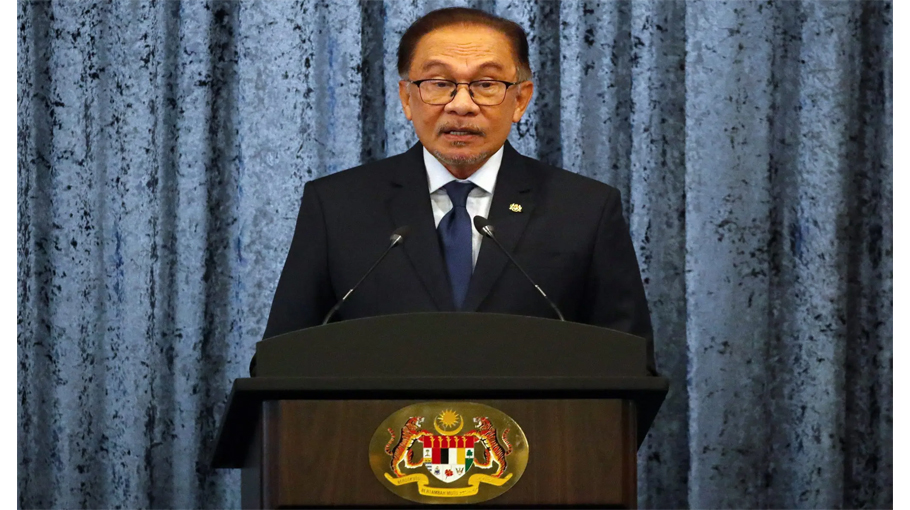Assessing Anwar Ibrahim’s administration’s first year

Concerns ranging from a falling Malaysian ringgit and pervasive anxiety over inflation to disquiet over a Palestinian solidarity program in schools hover over public space as Malaysia’s Anwar Ibrahim marks his first anniversary as prime minister.
Anwar’s Pakatan Harapan coalition approached the November 2022 general election with a simple promise to get back on track after the COVID-19 pandemic. Only one of Pakatan Harapan’s 10 key campaign pledges touched on ‘combating corruption and strengthening democracy’. Others addressed perennial concerns such as the cost of living and ‘empowering youth’s economic opportunities’.
The surprise turn of events that saw Anwar appointed as prime minister generated hope for change. The government’s initial post-election public approval reached 61 per cent in December 2022. By October 2023, that level had declined to 41 per cent as optimism faded.
A deciding factor in the meteoric rise of challenger Perikatan Nasional was the economic fallout from the pandemic. Household incomes declined in 2020 and 2021 as the country’s workforce grappled with lockdowns that crippled the retail and service sectors. The slow pace of economic recovery and lingering positive regard for former Perikatan Nasional prime minister Muhyiddin Yassin, who presided over a substantial financial aid package for households and businesses, helped boost the coalition’s appeal.
Anwar’s first act as prime minister was to convene a cost-of-living meeting with bureaucrats to develop measures for remediation. His flagship policy is a ‘Madani Economy’ framework. But global uncertainties and domestic constraints limit the administration’s options. A year on, Anwar continues to carry the burden of leading a party that critics see as pandering to non-Malay interests and that, to bolster its Malay base, partnered with the distrusted Barisan Nasional.
Pakatan Harapan’s coalition with Barisan Nasional undermined many voters’ confidence in the new government, especially given Deputy Prime Minister Ahmad Zahid’s 47 then-pending charges for money laundering and corruption. His dismissal-not-amounting-to-acquittal in September 2023, mere weeks after six states’ elections, only aggravated cynicism regarding the administration’s commitment to addressing corruption. So tenuous a coalition, against a backdrop of recently disastrous factional rifts, has left Anwar seemingly wary of trusting anyone but his closest advisors.
That non-Malay voters still turned out strongly for Pakatan Harapan in the August 2023 state elections may represent a lack of alternatives more so than tolerance for the current governing coalition. Barisan Nasional’s presence in government caused Malay voters to distance themselves from the unity government.
Perikatan Nasional made further inroads into Malay constituencies in Malaysia’s west coast. This was despite Anwar’s attempts to woo Malay votes with Islamist policies, such as increasing funding for Islamic schools and promising to table a long-controversial amendment to the Syariah Courts (Criminal Jurisdiction) Act of 1965 to further empower Syariah Courts. The presence of the United Malays National Organisation in the government has kept governance reforms focussed on targeted, practical fixes, such as passing a Fiscal Responsibility Act and reviving the Parliamentary Services Act, repealed in 1992.
Beyond these tentative steps, the administration’s ability to deliver on reforms depends on support of the 1.6 million strong and overwhelmingly Malay civil service. The World Bank has described Malaysia’s previously competent civil service performance as in decline in recent decades. The civil service has little affinity for Pakatan Harapan, as seen by the paltry support these voters gave the coalition in 2022. 2023 state elections saw the civil service swing further away from Barisan Nasional towards Perikatan Nasional.
The civil service sees itself as the guardian of Malay interests. In the wake of the political turmoil of the past four years, the civil service has grown increasingly confident of its own stabilising role — politicians come and go, but the bureaucracy endures.
Politicians confront an additional handicap in enacting policies or changes. Aware of the enormous power the civil service wields, the administration takes pains not to create undue friction. This deference has come at the cost of slower-than-expected progress on critical policies, such as for subsidy rationalisation, school curricula and labour.
Perhaps the most critical curb on the administration’s ability to enact robust reforms or contain Perikatan Nasional’s influence has been the slim public purse. The government is running a current balance deficit, meaning revenues cannot cover operating expenses. This gap will only continue to widen, especially as the long-standing safety-net of petroleum revenues frays. It can be addressed only by a steady influx in investments to generate government tax revenues. Such measures will take years to be realised. In the meantime, the administration will need to cut operating costs, raise taxes, or both. Neither of these fixes are crowd-pleasing.
The administration may need to choose between strategies pegged towards cultivating votes or towards more aggressively pursuing what is right. By raising revenues, whether through cutting popular subsidies, raising taxes or both, the administration might buy itself the resources to implement initiatives that can directly address the needs of a sceptical and often struggling public.
Doing so will not necessarily assuage Pakatan Harapan’s supporters’ desire for governance, civil liberties and other reforms, but tangible economic improvements could at least retain some Malay support and trust in advance of the next general election.
Ibrahim Suffian is Co-Founder of the Merdeka Center for Opinion Research.
Meredith Weiss is Professor of Political Science and Director of the SUNY/CUNY Southeast Asia Consortium at the University at Albany, State University of New York.
Source: East Asia Forum




